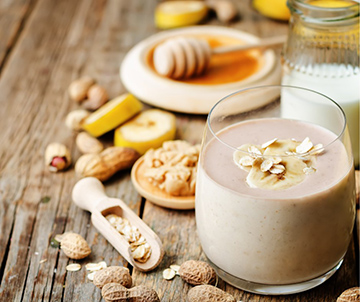ST. LOUIS — The term “plant-based diet” has garnered a lot of attention and headlines in recent years and for good reason. Research over many years has linked plant-based diets to lower rates of heart disease, type 2 diabetes, and some cancers. What better way to start out the New Year than with a new diet rich in all the vitamins and minerals that plants and dairy foods have to offer?
What does “plant-based” mean?
So what exactly is a plant-based diet, and does it have superior health benefits? Plant-based diet has no official definition. For some, it means choosing plant foods first, including fruits, vegetables, nuts, seeds, legumes, and whole grains, before adding foods from animal sources, such as cheese, yogurt, chicken or beef. For others it means only choosing plant foods, omitting the other food groups, and potentially the nutrients they provide. According to registered dietitian, Maggie Cimarolli, “The term plant-based can allow for flexibility in personal food preferences, while aiming to increase daily plant food consumption.”
What are the health benefits?
There is no denying the benefits plant foods offer. Fruits and vegetables provide a variety of vitamins and minerals, including antioxidants with numerous health benefits. Whole grains, nuts, seeds, and legumes offer protein and an array of vitamins and minerals. All plant foods offer fiber, important for satiety, digestion, and cardiovascular health.
Recognizing their benefits in overall health and disease prevention, does this mean choosing only plant foods is best? “Eating from a variety of food groups is the best way to meet your nutrient needs and allows for the flexibility that is important for successful lifestyle changes,” says Cimarolli.
How do dairy and plants work together?
Decades of research show plant and dairy foods can help reduce the risk for various diseases and help American get more of the nutrients they are lacking. For example, most Americans do not get enough calcium, vitamin D, potassium, and fiber in their diets. Milk is the leading food source of calcium, vitamin D, and potassium, while plant foods provide fiber. Together, they are a perfect team to cover all of these nutrients.
Additionally “probiotics,” the healthy bacteria found in fermented dairy foods like yogurt and kefir, offer a variety of health and digestive benefits. Plant foods also function as “prebiotics,” helping to feed the healthy bacteria present in the digestive tract. Together, dairy foods and plant foods can help maximize these individual health benefits.
There are many different nutrients our bodies need every single day to be as healthy as possible. Specific nutrients, such as vitamin B12, are important components of a healthy diet that plants cannot supply. Complete proteins, which are proteins with all the necessary building blocks, are also more difficult to get from only plant-based foods. By incorporating dairy with your plant sources, you can ensure nutrients such as vitamin B12 and complete, quality protein are consumed.
Tips for the Perfect Pairing
Try these easy ways to mix and match dairy and plant-based foods in a matter of minutes:
Combine cottage cheese and your favorite fruit
Serve up apple slices with cheddar cheese cubes
Sprinkle shredded cheese on top of a mixed salad
Top Greek yogurt with strawberries and granola
To learn more about how dairy and plant-based foods work together to maximize health, visit www.stldairycouncil.org and check out our “Dairy + Plant-Based Diets” under “Our Resources.” Reach Maggie Cimarolli at 314.835.9668 or mcimarolli@stldairycouncil.org. Follow the St. Louis District Dairy Council on Facebook and Instagram at STLDairyCouncil.

Peanut Butter Banana Overnight Oats
Start your new year with this easy, plant-based recipe for an on the go breakfast that will be sure to keep you fueled up all day long. With milk’s 13 essential nutrients, fiber from the oats, protein from the peanut butter and dairy foods, and not to mention the delicious taste, you will be ready to ring in the new year with a healthy routine!
Prep time: 10 minutes
Servings: 1
Ingredients:
1/3 cup old fashioned oats
1/3 cup milk
1/3 cup plain yogurt
½ medium banana, sliced, divided
2 Tbsp. peanut butter
½ Tbsp. honey
¼ tsp. vanilla extract
¼ tsp. cinnamon
1 tsp. chia seeds (optional)
Directions:
Mix oats, milk, yogurt, peanut butter, honey, vanilla, cinnamon, and chia seeds together in bowl.
Layer ½ mixture in a sealable container or jar. Top with half of the banana slices. Repeat with remaining mixture and banana slices.
Seal container with lid and place in refrigerator overnight.
Enjoy in the morning.
